
The growing U.S.-China trade war may well push the world's second-largest economy to work toward winning even more global clout, according to an economist at a widely followed investment group.
In fact, Eric Fishwick, head of economic research at CLSA, said the ongoing trade tussle between Washington and Beijing could actually push China to shore up both its economy and its geopolitical positioning.
"It may well have the perverse reaction of accelerating China's attempts to move up the supply curve ... to become self-sufficient (in) more and more high-tech products. And it will certainly encourage China in its moves to build more and more political and economic spheres of influence," he told CNBC's Akiko Fujita at the 2018 CLSA Investors' Forum in Hong Kong.
He pointed to the country's mammoth Belt and Road Initiative — an infrastructure and investment program widely seen as an attempt by China to construct a massive, multi-national zone of economic and political influence that has Beijing at its center.
On the economic development front, China has been on a mission to move toward high-tech industries, with its Made in China 2025 plan seeking to establish manufacturing strength in areas such as robotics and electric vehicles. The strategy aims to move the country beyond fabricating and exporting basic goods such as clothing and consumer electronics.
As for the origins of the trade war, Fishwick said politics played an important role. The ongoing negotiations were kicked off, he said, partly due to the U.S. becoming uncomfortable with China's growing power.
"This is really because China is the next geo-economic and geopolitical rival to the U.S., and the U.S. is uncomfortable with that," he said. "I do not believe that either side will particularly (be) willing to compromise given that it's more a political issue rather than simply a trade issue."
Fears of trade tensions escalating rose on Friday when U.S. President Donald Trump warned he was ready to impose tariffs on another $267 billion of Chinese goods, on top of the $200 billion in duties that he had already threatened to slap on China.
China's trade surplus with the U.S. widened to a record in August, even as the country's export growth slowed slightly.


